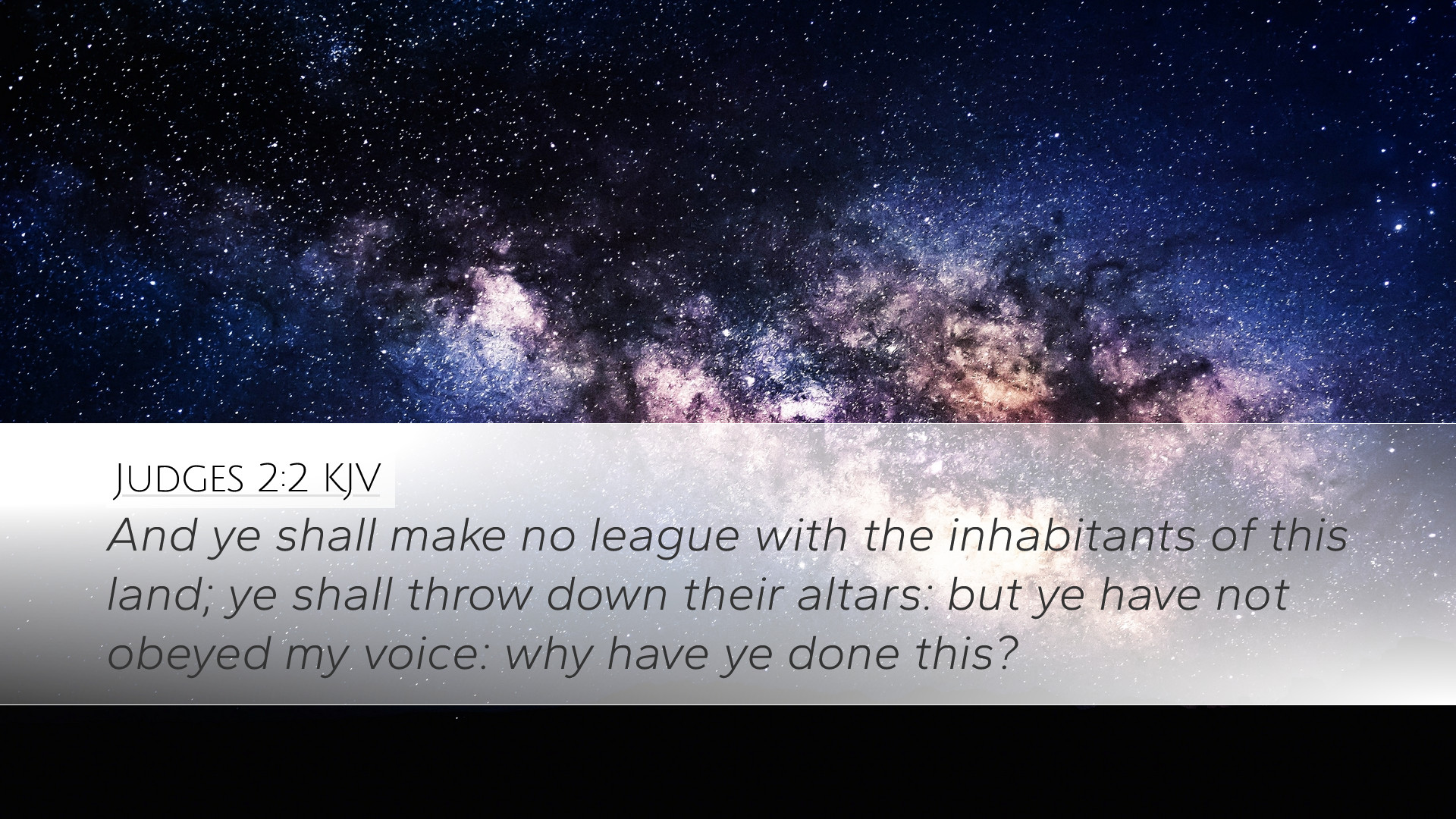Old Testament
Genesis Exodus Leviticus Numbers Deuteronomy Joshua Judges Ruth 1 Samuel 2 Samuel 1 Kings 2 Kings 1 Chronicles 2 Chronicles Ezra Nehemiah Esther Job Psalms Proverbs Ecclesiastes Song of Solomon Isaiah Jeremiah Lamentations Ezekiel Daniel Hosea Joel Amos Obadiah Jonah Micah Nahum Habakkuk Zephaniah Haggai Zechariah MalachiJudges 2:2
Judges 2:2 KJV
And ye shall make no league with the inhabitants of this land; ye shall throw down their altars: but ye have not obeyed my voice: why have ye done this?
Judges 2:2 Bible Commentary
Commentary on Judges 2:2
Verse Reference: Judges 2:2 - "And you shall make no league with the inhabitants of this land; you shall throw down their altars: but you have not obeyed my voice: why have you done this?"
Contextual Background
The book of Judges introduces a crucial period in Israel’s history, characterized by the cyclical pattern of sin, oppression, repentance, and deliverance. Judges 2 is pivotal as it lays the foundation for understanding Israel’s failure to maintain covenant loyalty to God amidst a polytheistic environment.
Insights from Public Domain Commentaries
Matthew Henry's Commentary
Matthew Henry emphasizes that this passage demonstrates God's expectation of Israel, stressing the importance of obedience to God’s commands. He notes that the Israelites were instructed to eradicate the altars of the foreign gods, signifying a complete separation from the corrupting influences of the surrounding nations.
- God's Covenant: God had a covenant with His people that required them to be distinct from other nations.
- Disobedience: Their failure to obey God's command signifies a deliberate choice to cohabit with sin and idolatry.
- Consequences: This disobedience ultimately leads to their spiritual downfall, as they would be influenced by the inhabitants they were supposed to drive out.
Albert Barnes' Commentary
Albert Barnes offers an analytical perspective on the significance of the term "league." He interprets this as a warning against alliances that compromise spiritual integrity. He elaborates on the historical context, indicating the significance of this command in maintaining Israel's identity as a holy nation.
- Symbol of Compromise: Forming a league with the inhabitants represents a spiritual compromise that leads to syncretism.
- Covenantal Faithfulness: Israel's call to throw down their altars illustrates a need for purity in worship and fidelity to Yahweh alone.
- The Root of Failure: Their disregard for divine instruction exposes the human tendency towards rebellion and disobedience.
Adam Clarke's Commentary
Adam Clarke elaborates on the theological implications of this verse, associating the rejection of God’s command with a broader theme of spiritual decay. He suggests that the Israelites’ inability to maintain their separation from the peoples of the land signals a lack of reverence towards God's justice and authority.
- Spiritual Decline: The verse serves as a poignant reminder of the rapid decline that follows disobedience.
- Idolatry's Threat: Clarke warns that the physical presence of the altars likely led to the spiritual downfall of the Israelites, as they were tempted away from monotheism.
- Divine Judgment: The severity of God's displeasure is evident; the phrase “why have you done this” serves as a lamentation over their failure, indicating His ongoing concern for their spiritual welfare.
Application for Modern Readers
For contemporary pastors, students, theologians, and scholars, this passage invokes critical reflection on the themes of obedience, identity, and spiritual vigilance. The directives given to Israel resonate today, calling believers to guard against compromising their faith in a pluralistic society.
- Obedience to God: The command to "make no league" with the inhabitants invites believers to consider their own associations and the potential influence of worldly ideologies.
- Covenantal Identity: Understanding the identity rooted in Christ encourages a separation from behaviors that contradict the character of God.
- Awareness of Influence: Just as the altars represented a spiritual threat, modern distractions can pull believers away from the core truths of their faith.
- Engaging with Culture: This passage prompts questions about how to engage with culture without becoming entangled in it.
Conclusion
Judges 2:2 stands as a solemn reminder of the continual need for vigilance in our spiritual lives. The insights from Matthew Henry, Albert Barnes, and Adam Clarke collectively underline the weight of divine expectation placed upon us to remain steadfast against the tides of compromise. As stewards of God’s message, it is incumbent upon believers to heed the warnings of the past while embracing the path of righteousness laid before them.


